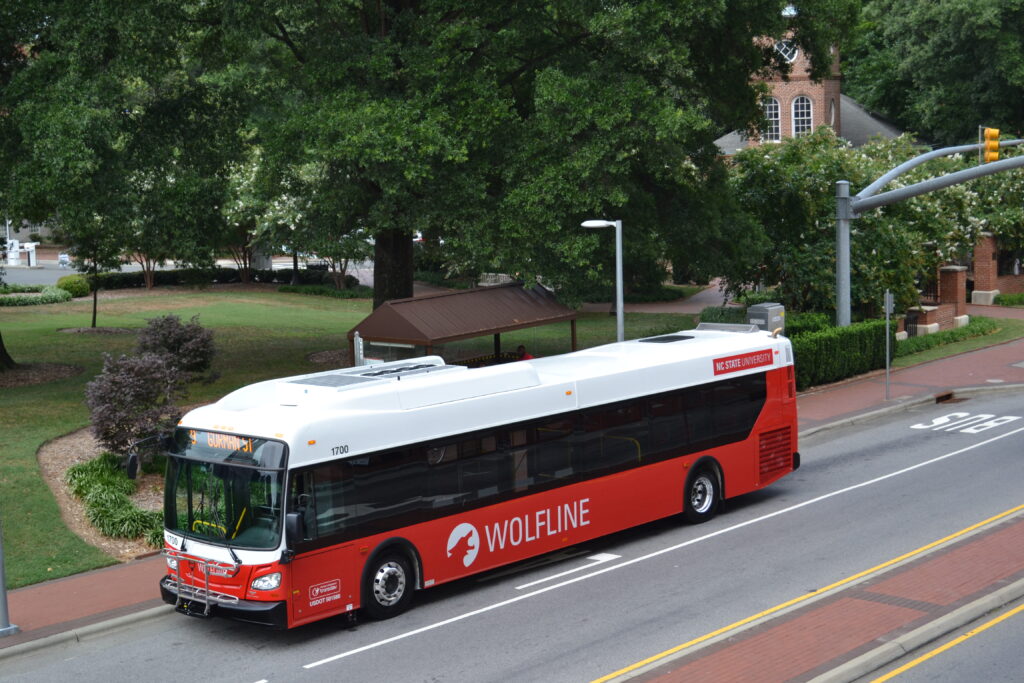About NC State Transportation

- Management of a 20,000 parking space inventory
- Parking services
- Campus transit services
- Transportation alternatives
- Operation and maintenance of parking facilities for vehicles, motorcycles, and bicycles
- Parking citation review and adjudication
- Coordination of campus event parking
Transportation is authorized by the NC State University Board of Trustees.
Looking for a specific staff member or office?
Our Mission
Moving you to succeed through reliable, innovative, and collaborative services.
We are committed to:
- Proactive and cooperative planning of transportation services and facilities to support the University’s Master Plan and future programs.
- Forming partnerships within the University and with our neighbors to effect positive change.
- Responsible, effective, and efficient use of revenues and resources in providing services and facilities.
- Providing proper maintenance to transportation facilities.
- Providing a transportation system that affords reasonable access for employees, students, visitors, and service providers.
- Offering a variety of alternative travel modes to reduce vehicle congestion and emissions.
- Providing parking enforcement that promotes voluntary compliance with parking regulations and ensures effective management of the parking system.
- Providing accurate and timely information to the campus community and guests.
- Seeking continuous feedback from our customers to measure success and improve services.
Our Vision
Transportation provides exceptional and professional services by continuously challenging and empowering our staff to improve systems, processes, and procedures. As a department and as individuals, we will establish ourselves as integral and contributing members of the University who continually strive to meet our community’s dynamic and diverse transportation needs.
Our Values

Our employees are our greatest asset. Their knowledge, individualism, and varied experiences strengthen our organization. We will provide them with the tools they need to carry out their respective duties and encourage them with a clear vision, constructive feedback, and coaching. Only by ensuring their individual successes will we ensure the success of our organization and the University’s mission.
Transportation Planning
Physical Master Plan
Physical Master Plan: The University master plan outlines a vision for infrastructure improvements in all campus precincts, including the campus transportation network. The NC State University Physical Master Plan: A Campus of Neighborhoods and Paths provides design guidelines for pedestrian, vehicular, and transit paths, as well as parking. This master plan is a foundation for shaping current and future transportation projects and is updated regularly as new campus development occurs.
Transportation Master Plan: NC State University Transportation Master Plan
Wolfline Service Planning
2012 Campus Mobility Plan: NC State Transportation initiated a plan to look at 10-year implementation options and funding needs for the campus mobility system. Action plans and phasing recommendations focused on the Wolfline transit system’s capacity to handle future demand, service hour growth, route revisions, fleet characteristics, park & ride transfer facility needs, and benefits from future road access controls and/or new construction.
Monthly Performance Review: Wolfline transit operations are monitored regularly. In addition to monthly performance reports, planning evaluations are conducted before every semester to make appropriate changes to Fall, Spring, and Summer transit routes and schedules.
Roadways and Traffic Management
Roadways and Traffic Management: NC State Transportation oversees traffic operations on all campus roadways, including intersection signalization, traffic speed, and control signage. The department also manages gated access to certain parking facilities and campus roads. Examples of planning and project work that the department directs on an ongoing basis include:
- On-road sample annual counts and analysis of traffic levels and speeds
- Traffic control signage needs
- Accident patterns
Bicycle / Pedestrian Mobility
Bicycle and Pedestrian Mobility: The Campus Bicycle and Pedestrian Plan strives to create more opportunities for bikeability and walkability at NC State. The Plan includes an implementation plan for recommended infrastructure improvements and covers topics such as enforcement and outreach.
Parking Supply and Siting
Parking Supply and Siting: NC State Transportation assists in the development of short and long-term parking plans in response to specific requests ranging from permit redesignation of existing parking spaces to impacts of major construction projects displacing or adding parking capacity on campus, thereby altering parking opportunities (and behavior) for our everyday customers.
NC State Transportation works closely with Capital Project Management, Design and Construction Services, and the Office of the University Architect to review all phases of planning for capital projects on campus. In addition, we annually update the parking inventory of nearly 19,000 spaces.
Transportation Sustainability
Sustainability: Transportation represents a key component of NC State’s commitment to developing and implementing a strategic campus sustainability plan that complements longer-term approaches to reducing greenhouse gases and the University’s carbon footprint. Strategies and tactics have been implemented for transportation-related elements of the Plan and are monitored annually.
Regional Partnerships
Regional Partnerships: NC State Transportation regularly conducts short—and long-range planning studies and operations evaluations. Transportation also partners in regional transportation planning studies that impact the University. These include multi-modal forums and technical studies with regional partners such as the City of Raleigh, Wake County, the North Carolina Department of Transportation (NCDOT), and the Capital Area Metropolitan Planning Organization (CAMPO).